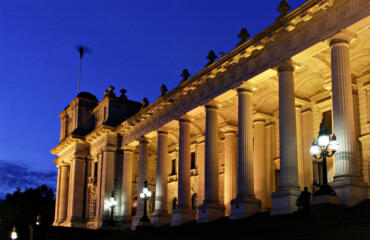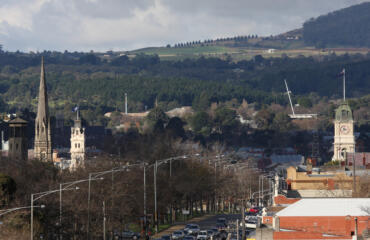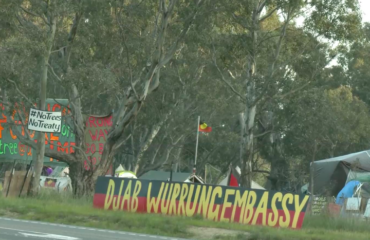Nyadol Nyuon, a self-described “Australian and immigrant of African appearance”, regularly receives racist messages online. Her mother has been called a “black dog” while walking down the street. She worries about the accumulating weight of abuse directed at her three-year-old daughter. At times, the commercial lawyer and Sudanese community advocate fears for her safety when walking in public.
“This is personal,” Ms Nyuon explained in talking about the impact of the political and media rhetoric around crime and “African gangs” in Victoria.
Ms Nyuon was participating in a panel at the University of Melbourne this week, discussing race and crime with senior Victorian journalists and former Victoria Police Commissioner Christine Nixon.
With a Victorian election looming in November, and a federal poll next year, all the panellists agreed that politics has played a powerful role in shaping and amplifying coverage of allegations and crimes involving Sudanese immigrants. Associate editor of The Australian, John Ferguson said law and order was a “red hot” issue in both the state and federal elections.
Channel 7’s Brendan Donohoe agreed, “[Mr Dutton] even talked about African crime when he was in Mayo for the South Australian by-election as though that was an issue over there.”
“We’re in the middle of an ugly and uncompromising debate that’s been teased out, exploited and used,” said Michelle Griffin, news editor of The Age.

Panelists agreed that Dutton’s comments about Victorians being too frightened to go out at night were “overblown.”
The panellists also observed they had seen it all before. “It started in the 1850s when we demonised the Chinese. We did it with the Irish, the Italians, the Vietnamese, Lebanese and now it’s the Sudanese,” said Ms Nixon.“With the Vietnamese it was about the drugs, the Sudanese it’s about street crime,” she said. “It’s a tradition in this country.”
“This is a re-run with a bit of a different theme,” agreed John Ferguson, Melbourne-based associate editor at The Australian. This year, he said, that theme was African gangs.
Crime in Victoria has been a hot issue in media and politics over the past six months, with Home Affairs Minister, Peter Dutton, igniting controversy in January when he told Sydney radio that Victorians were “scared to go out to restaurants” because of “African gang violence”. In the months since, numerous media reports highlighting incidents involving youths of African appearance have stoked community fears.
Sudanese community leaders have acknowledged concerns around a small hard-core of repeat offenders, and Victoria Police has responded with statistics showing that South Sudanese youths are over-represented in motor vehicle theft and aggravated burglaries. However, they do not identify it as a substantially gang-related issue.
There was general agreement across the panel that Mr Dutton’s comments had been overblown and politically opportunistic. Mr Ferguson said he didn’t think the “Dutton formula” worked in Victoria – “I think everyone’s laughing at it” – and that the mantra of African gangs would soon subside.
“I think it’s a very difficult debate, but I don’t think it’s necessarily a bad debate to have,” Mr Ferguson said.
“You people should not have to go through this,” he said to Ms Nyuon. “But I think what happens, and I’ve seen this happen before, the wave crashes … everything settles. Everyone will get bored with it. And then positive things will come out of it.” He said the media should be telling more positive stories about the Sudanese community, adding that he had recently returned from a reporting trip to Sudan.
But Ms Nyuon countered that the issue was not a “laughing matter”, and that the damage would be long term. “It affects all of us. It affects the job I do. It affects my family.
“When you say it goes away, you are saying it from the perspective of someone who is not in the community.”
Despite declining crime rates in Victoria, a recent Ipsos poll found that voters perceive crime to be the biggest issue facing the state, outstripping healthcare, transport, cost of living, education or housing.
Ms Nixon said that fear was always a potent force in politics. “In the end, this is about making people afraid,” she said. Even if the statistical story showed clearly that fear was unfounded, getting that message across was extremely difficult, she said. “When I was in Vic Police, in the end we just gave up trying to make people not afraid. Every time you worked with a community and tried to get the reality out about the level of crime and the risk that there really was for people in our communities, you’d get a front page headline that stuffed it all.”
At the heart of the debate were questions around the role and responsibilities of the media in reporting on crime in the state. Director of the Centre for Advancing Journalism and panel chair, Dr Andrew Dodd, observed that the Australian media’s code of ethics states that a journalist “should not place unnecessary emphasis on personal characteristics, including race, ethnicity or nationality”, provoking a discussion of when such emphasis was necessary.
Ms Griffin said the general protocol in The Age was to include ethnicity and appearance where an alleged perpetrator was being sought for a crime, when this information was useful.

Michelle Griffin, John Ferguson sitting on the panel, “Race, Politics and the looming election,” convened by the Centre for Advancing Journalism.
Despite Africans making up one per cent of alleged offenders, their crimes regularly make headlines. Ms Griffin said this sometimes reflected the violent nature of certain crimes, which could have “ripple effects” within the community.
“When a woman has her car rear-ended and she gets out and three youths come up to her and pistol whip her and take her car, that’s not just her little story. It shocks everyone she knows, everyone who knows everyone who knows her. And all the other people around her. Those stories unfortunately trump stats every single day.”
Mr Ferguson said including ethnicity was not an editorial decision, rather that most stories were simply passing on the information provided by Victoria Police.
“Vic Pol is driving this, they’re the one releasing the vision. I find it amazing that no one is asking this,” he said. “You watch the TV news at night time, it’s crime, crime, crime. 90% are coming out of Vic Pol HQ.”
He said he was concerned that Australian media did not give enough positive coverage of the South Sudanese Community, exploring its issues and history – adding that he had recently travelled to South Sudan and would be filing stories on the reality people had left. “We should celebrate more what your people do and have done so that’s a flaw in the media broadly. I don’t think it’s any particular outlet, I think it’s a flaw.”
Mr Donohoe pointed to the cross-platform circulation of CCTV footage as feeding “into the fear cycle and the perception cycle.
“What they see more and more on television and on websites, they see the vision everywhere now. They see the actual crime happening, before you didn’t see that.”
Mr Ferguson said the crimes by African youths being discussed were a real issue and that journalists should not subscribe to “censorship” in reporting those crimes. “I’m one of those very old school people, you don’t run away from the facts.”
Ms Nyuon said she wasn’t arguing for censorship, but rather for equal treatment when including ethnicity as a descriptor. “When a white young person does a crime, there is not emphasis on race and that divergence is what most of us have a problem with,” she said. “Because when we emphasize race, ethnicity, we actually shift our attention from what matters, from what can change.
“We can’t change someone’s race but we can improve their ability to get employment, and that’s where the debate is not occuring. That is the problem.”
Ms Nyuon said that sensationalised reporting, such as a recent Channel 7 special on “African gangs” that sparked protests outside the broadcaster’s headquarters, often overlooked the fears felt within the South Sudanese community. “And that fear is real. That is not a fear that has had much coverage.” She recalled the savage murder of her friend, Liep Gony, who was bashed to death near Noble Park train station in 2007.
“He was picked out from the street and bashed. He lost his life. He was 19. I played basketball with him.”
Ms Nixon hit out at The Australian, accusing the masthead of misrepresenting the reality of the law and order situation in Victoria by repeatedly putting a label on crime stories badging them “State of Disorder”. “It just really does damage the state of Victoria, crime has gone down. It’s just not the reality, this is not a state of disorder.”
Mr Ferguson defended the national broadsheet’s use of the label, arguing readers needed to be given credit to think critically about crime. “What we put in the paper, our readers are smart enough to work out,” he said. “I wouldn’t waste too much energy on it.”
Dr Dodd asked the panel to respond to comments by outgoing Race Discrimination Commissioner Tim Soutphommasane accusing the media of “monetising” racism – using racism to gain audience.
“I think that’s just ridiculous. It’s disgraceful that he’s said that,” said Mr Ferguson.
But The Age’s Michelle Griffin said she believed Australia was a racist country, and that narratives of racist experiences needed to be told more often. Referring to the stories shared by Ms Nyuon, she said: “That kind of testimony will make a big difference one by one.
“When I say that we’re a racist country, we’re also a country where if you look at us one on one if you hear a story like that, people respond powerfully.”
The panel discussion was recorded and will be broadcast shortly on ABC Radio National’s Big Ideas program.




